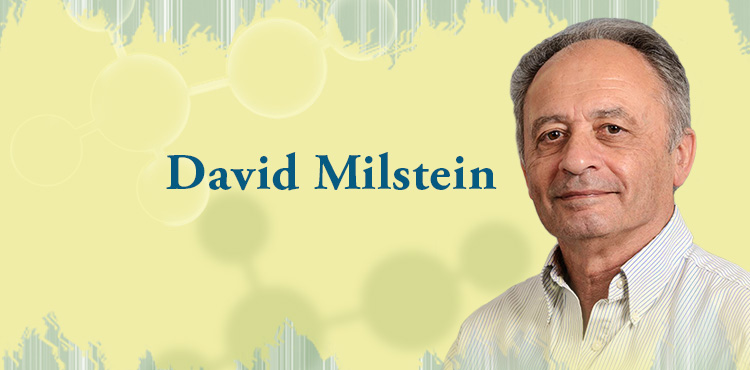
David Milstein
Israel Matz Professor of Organic Chemistry, Head of the Kimmel Center for Molecular Design, The Weizmann Institute of Science, Israel
Design of Catalytic Reactions for Sustainable Synthesis and Energy
The design of "green” synthetic methodology and new approaches to sustainable energy are major goals of modern catalysis. Traditionally, catalysis by metal complexes has been based on the reactivity of the metal center, while the ligands bound to it influence its reactivity, but do not interact directly with the substrate. In recent years, complexes based on “cooperating” ligands were developed, in which both the metal and a ligand undergo bond making and breaking in key steps of catalytic cycles, thus providing exciting opportunities for catalytic design. We have developed a new mode of metal-ligand cooperation, involving ligand aromatization – de-aromatization, which provides a new approach to the selective activation of chemical bonds. Pincer-type complexes of several transition metals exhibit such cooperation, leading to fundamentally new, sustainable catalytic reactions, including several reactions which either produce hydrogen or consume it. Applications in environmentally benign chemical synthesis, advanced biofuels, and hydrogen carriers will be describedDavid Milstein received his PhD degree at the Hebrew University of Jerusalem in 1976 with Prof Jochanan Blum. He carried out postdoctoral research at Colorado State University, where, together with his advisor John Stille, he discovered the Stille Reaction. In 1979 he joined the DuPont Company in Wilmington, Delaware, where he became a Group Leader in the homogeneous catalysis area. In 1987 he accepted a professorial appointment at the Weizmann Institute of Science, where he was Head of the Department of Organic Chemistry in 1996-2005. In 2000 he became Head of the Kimmel Center for Molecular Design. He is the Israel Matz Professor of Organic Chemistry since 1996. His research interests focus on the development of fundamental organometallic chemistry and its application to the design and implementation of new environmentally benign processes catalyzed by transition metal complexes. Special emphasis is placed on fundamentally new reactions for sustainable chemical synthesis and renewable energy resources. Dr. Milstein and coworkers have developed many group 8, 9, and 10 transition-metal complexes with specifically designed ligands that have proven useful to activate strong C-C, C-H, C-F, N-H, and O-H bonds.
Dr. Milstein has been recognized for his accomplishments with numerous national and international awards. These include the Kolthoff Prize by the Technion (2002); the Israel Chemical Society Prize (2006); the Miller Professorship, UC Berkeley (2006); the ACS Award in Organometallic Chemistry (2007); the RSC Sir Geoffrey Wilkinson Award (2010); the Meitner-Humboldt Senior Award (2011); the Israel Prize (2012), the Eni Protection of the Environment Prize (2016); the Israel Chemical Society Gold Medal (2017); and the European Prize for Organometallic Chemistry (2017). He was named Highly Cited Researcher by Thomson Reuters and listed among the World's Most Influential Scientific Minds (2014, 2015). Dr. Milstein was elected to the German National Academy of Sciences-Leopoldina (in 2006) and to the Israel National Academy of Sciences and Humanities (in 2012).
Dr. Milstein has also been awarded many lectureships, including the Inaugural Novartis Lectureship, Harvard University, 2009; the Arthur D. Little lectureship, MIT, 2009; the Novartis Lectureship, Scripps, 2010; the Lord Lewis Lectureship, Cambridge Univ, 2011; the Ernest Swift Lectureship, Caltech, 2011; the EuCheMs Lecturer, 2012; the Bohlman Lecture, TU Berlin, 2013; the Donald Cram Lectureship, UCLA, 2015; and the Sunney Chan Lectureship, Academia Sinica, Taiwan, 2017.
Dr. Milstein has served on the Editorial Advisory Boards of many scholarly journals, including Helvetica Chimica Acta, since 2016-; Catalysis Letters, since 2013-; Topics in Catalysis, since 2013-; Inorganic Chemistry, since 2012-; Progress in Inorganic Chemistry, since 2012-; Dalton Transactions, since 2012-; Israel Journal of Chemistry, since 2010-; ChemCatChem, since 2009-2016; Chemistry, A European Journal, since 2001-; Journal of the Chemical Society, Dalton Transactions, 2003-6; Organometallics, 1994-6; Journal of Molecular Catalysis, 1992-7; and Israel Journal of Chemistry, Guest Editor, 1991-2.

